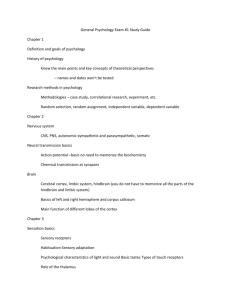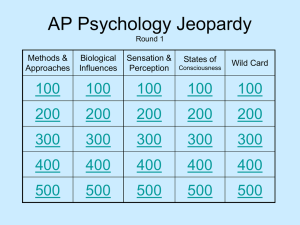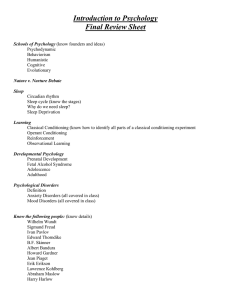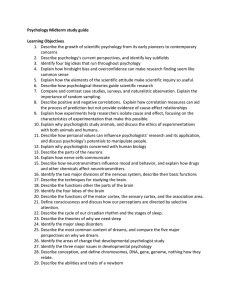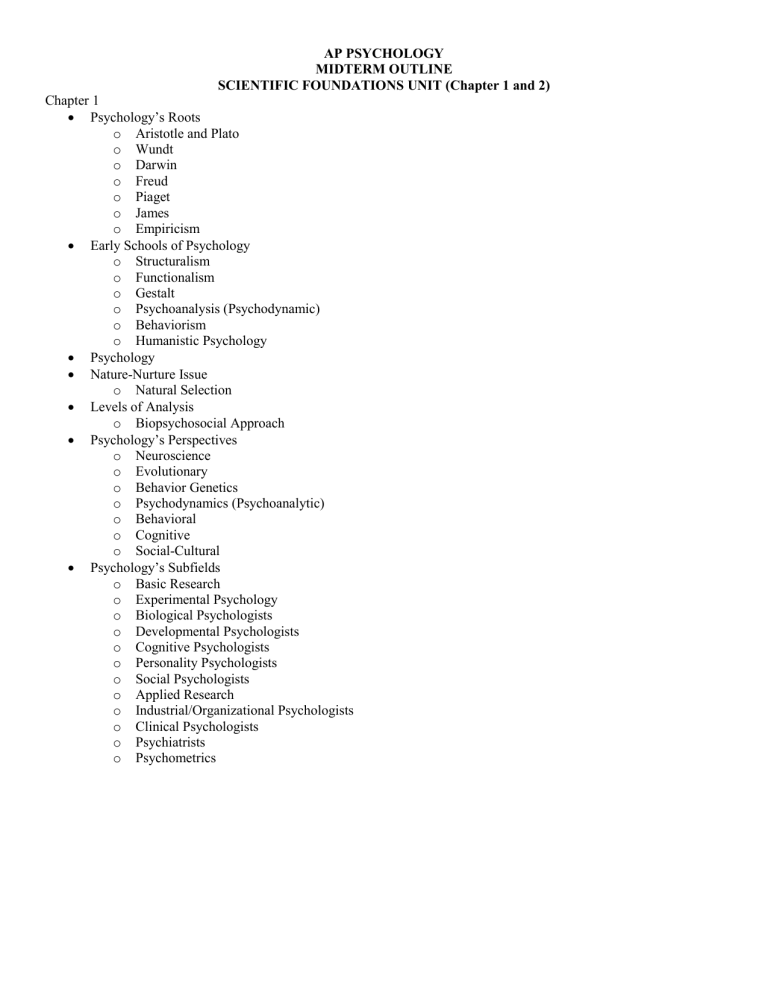
AP PSYCHOLOGY MIDTERM OUTLINE SCIENTIFIC FOUNDATIONS UNIT (Chapter 1 and 2) Chapter 1 Psychology’s Roots o Aristotle and Plato o Wundt o Darwin o Freud o Piaget o James o Empiricism Early Schools of Psychology o Structuralism o Functionalism o Gestalt o Psychoanalysis (Psychodynamic) o Behaviorism o Humanistic Psychology Psychology Nature-Nurture Issue o Natural Selection Levels of Analysis o Biopsychosocial Approach Psychology’s Perspectives o Neuroscience o Evolutionary o Behavior Genetics o Psychodynamics (Psychoanalytic) o Behavioral o Cognitive o Social-Cultural Psychology’s Subfields o Basic Research o Experimental Psychology o Biological Psychologists o Developmental Psychologists o Cognitive Psychologists o Personality Psychologists o Social Psychologists o Applied Research o Industrial/Organizational Psychologists o Clinical Psychologists o Psychiatrists o Psychometrics Chapter 2: Research Methods: Thinking Critically with Psychological Science The Need for Psychological Science o Limits of Intuition and Common Sense o Hindsight Bias o Overconfidence Scientific Attitude o Curiosity, Skepticism, Humility o Critical Thinking Scientific Method o Theory What do good theories do? o Hypothesis o Operational Definition o Replication Description o Case Study o Survey Wording Effects Sampling False Consensus Effect Population Random Sample o Naturalistic Observation Correlation o Correlation Coefficient o Scatterplots o Positive/Negative Correlations o Correlation vs. Causation o Illusory Correlation Perceiving Order in Random Events Experimentation o Experiment o Blind o Double Blind o Placebo o Control Condition o Experimental Condition o Random Assignment o Independent Variable o Dependent Variable Statistical Reasoning o Describing Data Histograms Bar Graph o Measures of Central Tendency Mode Mean Median Skewed Data o Measures of Variation Range Standard Deviation o Making Inferences When is a difference Reliable? When is a difference Significant? Statistical Significance FAQs o Can Lab Experiments illuminate everyday life? o Does behavior depend on one’s culture? Culture o Does Behavior vary with Gender? o Why do psychologists study animals? o Is it ethical to experiment on animals? On people? o Is psychology free of value judgements? o Is psychology potentially dangerous? BIOLOGICAL BASES OF BEHAVIOR (Chapter 3AB and 5) Chapter 3A: Neural Processing and the Endocrine System Phrenology Biological Psychology Neural Communication o Neuron o Efferent/Motor Neurons o Afferent/Sensory Neurons o Dendrite o Axon o Myelin Sheath o Resting Potential o Action Potential o Depolarization o Refractory Period o Threshold o Excitatory/Inhibitory Signals How Neurons Communicate o Synapse o Synaptic Gap/Cleft o Neurotransmitters o Reuptake How Neurotransmitters Influence Us o Dopamine o Serotonin o Norepinephrine o GABA o Acetylcholine (ACh) o Endorphins o Agonists o Antagonists o Blood-Brain Barrier The Nervous System o Central Nervous System o Peripheral Nervous System o Nerves o Interneurons o Glial Cells Peripheral Nervous System o Somatic Nervous System o Autonomic Nervous System o Sympathetic Nervous System o Parasympathetic Nervous System Central Nervous System o Brain and Spinal Cord o Reflexes o Neural Networks Endocrine System o Hormones o Adrenal Glands o Pituitary Gland o Feedback System between Brain and Endocrine System Chapter 3B: Neural Processing and the Endocrine System The Brain o Tools of Discovery Lesion Case Studies EEG CT Scan PET Scan MRI o Lower Level Brain Structures Brainstem Medulla Reticular Formation Thalamus Cerebellum Limbic System Amygdala Hypothalamus Pleasure Centers General Reward System Reward Deficiency Syndrome Cerebral Cortex o Frontal Lobes o Parietal Lobes o Occipital Lobes o Temporal Lobes o Functions of the Cortex Motor Cortex Sensory Cortex Association Areas Language Aphasia Broca’s Area Wernicke’s Area Angular Gyrus o Plasticity Divided Brains o Hemispherectomy o Corpus Callosum o Split Brains o Functions of the Left Brain o Functions of the Right Brain Handedness Consciousness Cognitive Neuroscience Dual Processing Chapter 5: Waking Consciousness o Consciousness o Serial Processing o Daydreams o Fantasy-Prone Personalities Sleep and Dreams o Biological Rhythms o Circadian Rhythm o REM Sleep o Alpha Waves o Sleep o Stage 1 Sleep o Hallucinations o Stage 2 Sleep o Sleep Spindles o Slow Wave Sleep o Delta Waves o Paradoxical Sleep o Why do we sleep? o Sleep Debt/Deprivation o Sleep Disorders Insomnia Narcolepsy Sleep Apnea Night Terrors o Dreams Lucid Dreams o Freud’s Wish Fulfillment Theory Manifest Content Latent Content o Information Processing Theory o Physiological Function o Activation Synthesis o REM Rebound Drugs and Consciousness o Psychoactive Drugs o Tolerance o Withdrawal Physical Dependence Psychological Dependence o Addiction o Depressants Alcohol Barbiturates Opiates o Stimulants Amphetamines Caffeine/Tobacco Cocaine o Hallucinogens LSD Marijuana (THC) o Influences on Drug Use Biological Influences Cultural Influences Psychological Influences Near Death Experiences o Dualists o Monists SENSATION AND PERCEPTION UNIT (Chapter 4) Sensation Perception Bottom-Up Processing Top-Down Processing Basic Principles o Psychophysics o Absolute threshold o Signal Detection Theory o Subliminal o Difference Threshold (Just Noticeable Difference) o Weber’s Law o Sensory Adaptation Vision o Transduction o Electromagnetic Spectrum o Wavelength o Hue o Intensity o Amplitude The Eye o Pupil o Iris o Lens o Accommodation o Retina o Acuity o Nearsightedness/Farsightedness o Rods/Cones o Optic Nerve o Blind Spot o Fovea Visual Information Processing o Neural Path from the Eye to the Visual Cortex o Feature Detectors o Parallel Processing o Abstraction Color Vision o Young-Helmholtz Trichromatic Theory o Subtractive Color Mixing o Additive Color Mixing o Color Deficiency o Opponent-Process Theory o Color Constancy Hearing (Audition) o Sound Waves o Frequency o Pity o Decibels The Ear o Eardrum o Middle Ear o Hammer, Anvil, Stirrup o Inner Ear o Cochlea o Basilar Membrane o Place Theory o Frequency Theory o Volley Principle o Sound Location Hearing Loss o Conduction Hearing Loss o Sensorineural Hearing Loss Other Senses o Touch 4 Skin Senses What is Pain? Gate Control Theory Pain Control o Taste (Gustation) How do we taste? Sensory Interaction o Smell (Olfaction) How do we smell? Smell and Memory o Body Position and Movement Kinesthesis Vestibular Sense Sensory Restriction o Sensory Deprivation o REST Selective Attention Perceptual Illusions o Muller-Lyer Illusion o Visual Capture Perceptual Organization o Gestalt o Form Perception Figure Ground Grouping Proximity Similarity Continuity Connectedness Closure o Depth Perception Visual Cliff Binocular Cues Retinal Disparity Stereograms Convergence Monocular Cues Interposition Relative Size Relative Clarity Texture Gradient Relative Height Relative Motion Linear Perspective Light and Shadow Motion Perception Phi Phenomenon Perceptual Constancy Shape Constancy Size Constancy Size-Distance Relationship Ponzo Illusion Moon Illusion Distorted Room Lightness Constancy Perceptual Interpretation o Sensory Deprivation o Restored Vision o Critical Period o Perceptual Adaptation o Perceptual Set o Schemas o Context Effects ESP o Parapsychology o Telepathy o Clairvoyance o Precognition o Psychokinesis o Is it legitimate or not? LEARNING UNIT (Chapter 6) Learning Associative Learning Behaviorism Classical Conditioning o Pavlov and his Dogs o Unconditioned Stimulus o Unconditioned Response o Neutral/Conditioned Stimulus o Conditioned Response o Acquisition o Extinction o Spontaneous Recovery o Generalization o Discrimination o Cognitive Processes o Biological Predispositions o Applications of Classical Conditioning Operant Conditioning o BF Skinner o Respondent Behavior o Operant Behavior o Thorndike’s Law of Effect o Operant Chamber (Skinner Box) o Shaping o Positive Reinforcement o Negative Reinforcement o Primary Reinforcers o Conditioned Reinforcers o Immediate and Delayed Reinforcers o Schedules of Reinforcement Continuous Reinforcement Partial (intermittent) Reinforcement Fixed Ration Schedule Variable Ratio Schedule Fixed Interval Schedule Variable Interval Schedule o Punishment Positive Punishment Negative Punishment Why Doesn’t Punishment Work? o Cognitive influences on Operant Conditioning Latent Learning Cognitive Map Overjustification Effect o Biological Predispositions for Operant Conditioning o Applications for Operant Conditioning Observational Learning o Mirror Neurons o Modeling o Bandura o Bobo Doll Study o Applications of Observational Learning o Prosocial Behavior o Role Models
